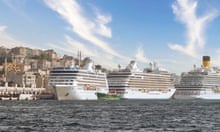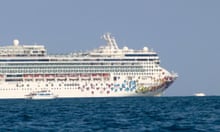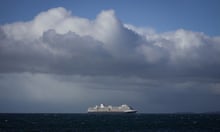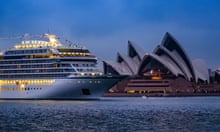Nearly 30 years ago, researching for a Guardian series on global population pressures, I interviewed the zoologist Desmond Morris. During that interview, Morris said something that was hard to forget. “We have to recognise,” he said, “that human beings may be becoming an infestation on the planet.”
Those words came back to me as reports came in about the increasing reaction in many parts of Europe against the depredations of mass tourism. Last week I read a stress-inducing story in the Times about appalling passport-check delays at Milan airport; three days later, I walked through those selfsame passport gates with only a brief and courteous check.
Nevertheless, when places from the Mediterranean to the Isle of Skye all start complaining more or less simultaneously about the sheer pressure of tourist numbers in their streets and beauty spots, as has happened this August, it feels as if the always uneasy balance between the visited and the visitors has gone beyond a tipping point.
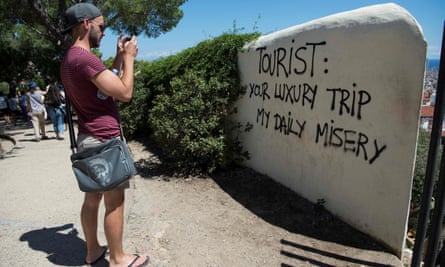
Pictures of a wall in Barcelona saying, “Tourist Go Home”, or of protesters in Palma saying, “Tourism Kills Mallorca” should touch an uneasy nerve in anyone whose summer getaway has taken them to places such as San Sebastián, Dubrovnik, Florence, Venice and – further afield – New Orleans and Thailand. For all of these have either taken or are considering measures to limit the relentless pressure from mass tourism by people like you and me.
Predictably, Venice is one of the most agonisingly pressured of all. It embodies the increasingly irreconcilable forces of vernacular life, tourism and sustainability in historic parts of Europe. But that doesn’t stop the millions arriving all the time – 28 million this year, in a city with a population of 55,000, many disembarking from monstrous cruise ships that dwarf the ancient city as they approach the Grand Canal. Each day in summer is a humiliation of most of the things the world treasures about Venice. Not surprisingly, many locals have had enough.
It’s a pattern that is replaying in different ways in other much-visited parts of Europe and beyond. Anarchists in Barcelona captured the headlines by holding up tourist buses in protest against the cost of living that they say is inflicted by tourism, especially by short-term-let companies such as Airbnb, which drive up housing costs. Next week, something similar is promised in the Basque town of San Sebastián.
But these are only the hot spots. The tourism problem runs far wider. Human beings across the world make more than a billion foreign trips a year, twice as many as 20 years ago. In Britain, statistics this week show we took 45 million foreign holidays last year, a 68% increase on 1996. And foreign trips cut both ways. Many of those who were interviewed in the media when the narrow road to Glen Brittle on Skye became jammed with traffic this week were European visitors, attracted not just by the scenery but by the advantageous exchange rate.
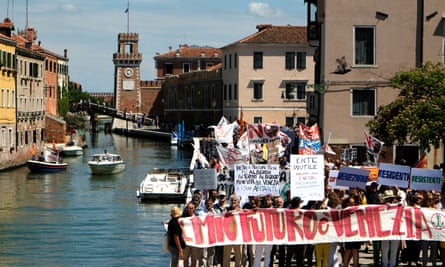
The problem shows itself in both supply and demand. There isn’t enough room for the many to walk through the centre of Dubrovnik, or enough public loos on Skye for the visitors. But the number of people wanting to visit such places is rising all the time, fed by greater global prosperity, cheaper air travel and increased overall provision of hotels worldwide. Tourism is now the largest employer on the planet. One in every 11 people relies on the industry for work. Unsurprisingly, few governments want to put a squeeze on such a source of wealth.
You only have to become a travel industry consumer, as many of us are doing this summer, to realise that you too are part of this problem, not the solution. We all want to go to places such as Venice. And we are mostly all willing to submit to the indignities and embarrassments that are involved in doing so – whether it’s irksome but necessary security checks or overcrowded departure lounges, no-frills flight regulations, car hire price-gouging and all the rest of it. Rationally, the European mass travel industry is not fit for purpose. I defy anyone to say they like Luton airport. Yet still we come. Few are seriously deterred.
Can anything be done to get the visited and visiting into a more sustainable balance? It is tempting to fall back on Morris-like pessimism and to suspect that it can’t, that the issues are unmanageable. There are multiple genuinely difficult issues involved here. The biggest, in a global sense, is the rise of Chinese tourism. But why should Chinese people be denied the rewards – for they certainly exist – of travel? The tourism industry’s carbon footprint is equally problematic. But if people want to take the planes, and the planes are available, who is to say that this should stop? Closer to home, it is beyond question that many British tourists behave badly abroad. The stag-do and hen-do culture is out of hand. But you can’t restrict access to Italy to those who know their Giotto from their Duccio.
Writing a few days ago, the writer Elizabeth Becker argued that only governments can handle runaway tourism. Governments can control entry to their countries, she said, can regulate airlines and ships, prevent inappropriate hotel development, and use taxes to shape visitor demand and benefit local people, place limits on rip-off prices that distort markets. Yet even Becker admits that most governments prefer things as they are. The prospect of truly effective coordination by governments remains distant.
It would be wonderful if governments could find effective ways to at least mitigate the worst problems. Some, such as those of Thailand and Bhutan, have been bold, even though most restrictions hit hardest at the less well-off and are most easily circumvented by the rich. The role of government action to ensure adequate and appropriate infrastructure in tourist areas is indisputable.
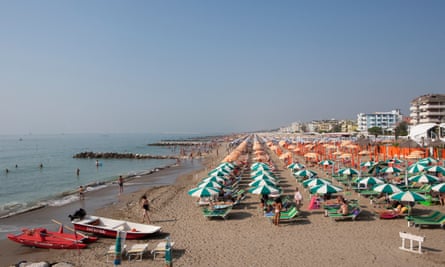
In the end, though, I think we have to take greater individual responsibility too. This will irk those who think of themselves as independent travellers rather than members of tourist herds, but unless we embrace individual and collective restraint more seriously, the destruction and damage to cities such as Venice or beauty spots such as Glen Brittle will simply grow.
We have to re-examine the idea that we enjoy an unfettered liberty to travel at will or for pleasure. We have to rethink the impulse that says that a holiday from work – or retirement from work – is an open sesame to exploring the world. We should learn from Henry David Thoreau that one can travel as much – and develop as much as a human being – in one’s own locality as in the far-flung and exotic corners of the globe.
Travel broadens the mind, they say. But is the person whose air-conditioned tour bus whisks them to a distant glacier in Patagonia or to the Mona Lisa for a quick selfie before depositing them at a characterless international hotel richer in experience than the one who spends the same amount of time watching the birds or the butterflies in the back garden? I doubt it. We may not be an infestation yet. But we are a problem. Travel can narrow the mind too.



